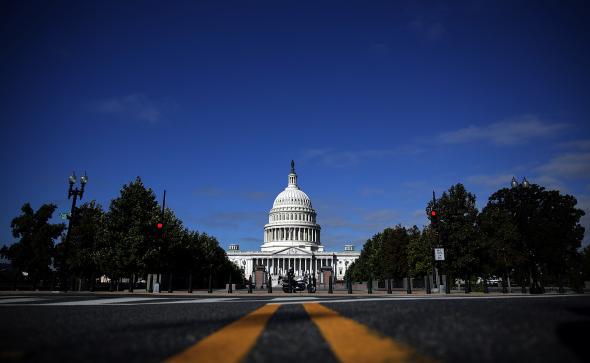The House and Senate voted Wednesday to override President Obama’s veto of legislation allowing families of those killed in the 9/11 terrorist attacks to sue Saudi Arabia. The controversial bill—which Obama and legal experts warned could have serious unintended repercussions for the United States—will now become law.
The congressional override was the first of Obama’s time in office. The House voted 348–77 in favor, with only 18 Republicans and 59 Democrats siding with the president. The Senate vote was 97–1, with Harry Reid all by his lonesome in the upper chamber. Here’s the New York Times with more on the legislation’s somewhat strange bipartisan history:
The bill’s triumphant journey came without significant congressional debate or intense pressure from voters, but rather through the sheer will of the victims’ families, who seized on the 15th anniversary of the attack and an election year to lean on members of Congress. That effort was aided by the fact that members’ collective patience with the kingdom has waned in recent years. …
[T]he override underscored the inherent smallness of Republican victories against Mr. Obama since seizing the majority in Congress in 2015. The veto override, while thrilling to many Republicans, came on a bill that was far from the Republicans’ self-identified priorities of unraveling the health care law and pushing back on government regulations. Nor was it a measure they had hoped to secure with the president’s help, like overhauling the tax code or passing a major trade agreement.
The bill—the Justice Against Sponsors of Terrorism Act, or JASTA—gives the victims’ families the right to sue the Saudi government in U.S. court for any role it may have played in the 2001 attacks, which were carried out primarily by 19 al-Qaida hijackers, 15 of whom were Saudi nationals. Previous attempts by the American families to sue Saudi Arabia were derailed by a law that severely limited U.S. courts’ ability to hear cases against foreign governments. With JASTA passed, now foreign governments can be held liable for aiding terrorist groups, even if that aid doesn’t occur on American soil.
There are two major problems with that, according to opponents of the effort, which Slate’s Mark Joseph Stern detailed earlier this year. For starters, it will complicate the United State’s already complicated relationship with Saudi Arabia. But it also risks opening the door for foreign governments to return the gesture by amending their own laws to allow their citizens to sue the U.S. government and its employees in foreign courts. That would cause quite the headache for Washington given how active the United States is abroad with everything from drone strikes to foreign surveillance to backing foreign militias. Shortly after Congress voted to ignore those concerns, which were voiced repeatedly by the White House, a group of 28 senators released a letter urging the Senate leaders to “appropirately mitigate those unintended consequences” now that they’d forced the original legislation through.
Elsewhere in Slate: Why the Push to Let 9/11 Victims and Families Sue Saudi Arabia in America Is So Controversial
